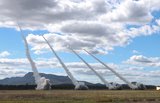I/ITSEC 2012: Rockwell simulation systems chosen by Pilatus Aircraft
Rockwell Collins has been selected by Pilatus Aircraft to provide simulation and training products and systems as part of long-term agreements with undisclosed Asian and Middle Eastern customers.
Announced during the I/ITSEC conference in Orlando, Florida, the first activities under the agreement will include Rockwell Collins providing its EP-8000 and EP-80 image generators and SpectraView displays.
LeAnn Ridgeway, VP and GM of Simulation & Training Solutions for Rockwell Collins, told Shephard that the company is seeing ‘great success’ with the fast jet market.
‘Historically Rockwell has so much experience in this,’ Ridgeway explained. ‘We are looking at the higher end
Already have an account? Log in
Want to keep reading this article?
More from Digital Battlespace
-
![Australia looks towards space with force restructure, investment and training]()
Australia looks towards space with force restructure, investment and training
Australia is looking to improve its presence in space with a focus on communications and creating a dedicated segment of its defence forces committed to the domain.
-
![EID to unveil new vehicle communication system at DSEI]()
EID to unveil new vehicle communication system at DSEI
The Portuguese company’s naval communications system is in service across more than a dozen countries. It has turned to its home nation for support in developing a new vehicle based C2 system.
-
![Chess Dynamics successfully demonstrates Vision4ce AI-driven tracker]()
Chess Dynamics successfully demonstrates Vision4ce AI-driven tracker
The Vision4ce Deep Embedded Feature Tracking (DEFT) technology software is designed to process video and images by blending traditional computer vision with artificial intelligence (AI) algorithms to present actionable information from complex environments.
-
![Wave Relay devices cleared for security use on commercial systems in industry trend]()
Wave Relay devices cleared for security use on commercial systems in industry trend
Persistent Systems has been cleared by National Security Agency (NSA) to transmit sensitive data on commercial networks. The devices are added to the NSA’s Commercial Solutions for Classified (CSfC) component list which also includes other companies’ products providing the same security.
-
![UK teases cyber spending boost in Strategic Defence Review ahead of “imminent” release]()
UK teases cyber spending boost in Strategic Defence Review ahead of “imminent” release
The release of the UK’s Strategic Defence Review (SDR) has been long promised as mid-year. It is possible it could be as early as 2 June although the UK Ministry of Defence (MoD) continues to play its cards close to its chest.
-
![Intelsat emphasises SATCOM resilience for SOF in contested domains (video)]()
Intelsat emphasises SATCOM resilience for SOF in contested domains (video)
Intelsat outlines how its multi-orbit SATCOM architecture is enhancing connectivity and resilience for special operations forces operating in degraded and contested environments.























